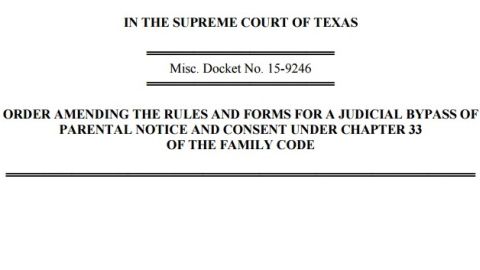
The Texas Supreme Court has changed the rules for judges considering so-called “judicial bypass” applications for minor girls seeking to get an abortion without the consent of their parents or guardians.
Click HERE to read and download the amended rules from the Texas Supreme Court.
News release from the Texas Supreme Court:
The Texas Supreme Court issued amended rules Tuesday governing how an unemancipated girl may seek a judge’s permission to get an abortion without getting a parent’s or guardian’s consent.
The amendments reconcile court rules to reflect the Texas Legislature’s changes specifying when and how a pregnant minor younger than 18 may apply for a so-called judicial bypass. Earlier this year legislators altered the bypass procedure to limit, among other changes, where a bypass application must be filed and raise the standard for evidence to prove the bypass is needed.
Amendments to the judicial bypass rules, effective Friday with the statutory changes, follow established rules for choosing judges to hear bypass applications if a presiding judge in a court to which a case has been assigned is not available to decide it. Pregnant minors who seek a court order for an abortion without parental or guardian consent generally must file their applications in the counties where they live unless they live in counties with fewer than 10,000 people.
The amended rules, with accompanying forms, preserve the existing confidentiality accorded to such procedures.
Bypass applicants must now verify, under oath or under threat of perjury, that they have not been denied a bypass they previously sought for the current pregnancy without showing a material change in their circumstances.
By statute, evidence to support the bypass must now be clear and convincing. Judges must make alternative inquiries: either one to demonstrate applicants are mature and informed about abortions, including familiarity with state-mandated information about the procedure, or one to determine whether a judicial bypass is in the pregnant minor’s best interests.
Under the rule changes, if a judge does not rule on an application within the five days the law now requires, the application will be deemed denied.
